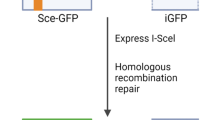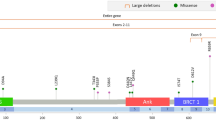Abstract
BRCA1 is involved in double-strand DNA damage repair pathways, and mutations in the gene are associated with hereditary breast and ovarian cancers. With great help of the development of high-throughput DNA sequencing techniques numerous single-nucleotide polymorphisms (SNPs) and insertion deletion (Indel) mutations are detected on both coding and non-coding/regulatory regions of the BRCA1. Mutations may cause pathogenic or benign changes on the protein function or affect its expression. In the last decade, use of genetic screening tests to detect mutations on such genes has become greatly popular. However, it is very important to know the effect of the detected mutations, which is mostly possible by the use of predictive softwares, and also the related family history to be able to correctly analyse the screening results and to inform the patient. Therefore, use of in silico and in vitro techniques to score the pathogenicity of detected variants on genes like BRCA1 is now of great importance. Otherwise, results obtained from screening tests and family history cannot be analysed precisely.
Similar content being viewed by others
References
Campbell CD, Eichler EE. Properties and rates of germline mutations in humans. Trends Genet. 2013;29(10):575–84.
Griffiths AJ, et al. Somatic versus germinal mutation. An introduction to genetic analysis. Stuttgart: W. H. Freeman; 2000.
Wu J, Lu LY, Yu X. The role of BRCA1 in DNA damage response. Protein Cell. 2010;1(2):117–23.
Petrucelli N, Daly MB, Feldman GL. Hereditary breast and ovarian cancer due to mutations in BRCA1 and BRCA2. Genet Med. 2010;12(5):245–59.
Lippi G, Mattiuzzi C, Montagnana M. BRCA population screening for predicting breast cancer: for or against? Ann Transl Med. 2017;5:13.
Godet I, Gilkes DM. BRCA1 and BRCA2 mutations and treatment strategies for breast cancer. Integr Cancer Sci Ther. 2017. https://doi.org/10.15761/ICST.1000228.
Hassan MM, et al. Bioinformatics approach for prediction of functional coding/noncoding simple polymorphisms (SNPs/indels) in human BRAF gene. Adv Bioinf. 2016. https://doi.org/10.1155/2016/2632917.
Deng N, et al. Single nucleotide polymorphisms and cancer susceptibility. Oncotarget. 2017;8(66):110635–49.
Smigielski EM, et al. dbSNP: a database of single nucleotide polymorphisms. Nucleic Acids Res. 2000;28(1):352–5.
Thery JC, et al. Contribution of bioinformatics predictions and functional splicing assays to the interpretation of unclassified variants of the BRCA genes. Eur J Hum Genet. 2011;19(10):1052–8.
Esposito MV, et al. A novel pathogenic BRCA1 splicing variant produces partial intron retention in the mature messenger RNA. Int J Mol Sci. 2016;17(12):2145.
López de Silanes I, Paz Quesada M, Esteller M. Aberrant regulation of messenger RNA 3 and M. Esteller, r Intron Retention. Cell Oncol. 2007;29(1):1–17.
Singh P, et al. Global changes in processing of mRNA 3′ untranslated regions characterize clinically distinct cancer subtypes. Cancer Res. 2009;69(24):9422–30.
Mao G, Pan X, Gu L. Evidence that a mutation in the MLH1 3′-untranslated region confers a mutator phenotype and mismatch repair deficiency in patients with relapsed leukemia. J Biol Chem. 2008;283(6):3211–6.
Karbassi I, et al. A standardized DNA variant scoring system for pathogenicity assessments in mendelian disorders. Hum Mutat. 2016;37(1):127–34.
Dorairaj JJ, et al. A germline mutation in the BRCA1 3′ UTR predicts stage IV breast cancer. BMC Cancer. 2014;14:421.
Brewster BL, et al. Identification of fifteen novel germline variants in the BRCA1 3′ UTR reveals a variant in a breast cancer case that introduces a functional miR-103 target site. Hum Mutat. 2012;33(12):1665–75.
Gochhait S, et al. Implication of BRCA2-26G>A 5′ untranslated region polymorphism in susceptibility to sporadic breast cancer and its modulation by p53 codon 72 Arg > Pro polymorphism. Breast Cancer Res. 2007;9(5):R71.
Evans DGR, et al. A dominantly inherited 5′ UTR variant causing methylation-associated silencing of BRCA1 as a cause of breast and ovarian cancer. Am J Hum Genet. 2018;103(2):213–20.
Sim NL, et al. SIFT web server: predicting effects of amino acid substitutions on proteins. Nucleic Acids Res. 2012;40:W452–7.
Zick A, et al. A BRCA1 frame shift mutation in women of Kurdish Jewish descent. Open Med J. 2015;2:31–6.
Benson JM, Therrell BL Jr. History and current status of newborn screening for hemoglobinopathies. Semin Perinatol. 2010;34(2):134–44.
Kaplan F. Tay–Sachs disease carrier screening: a model for prevention of genetic disease. Genet Test. 1998;2(4):271–92.
Bozkurt G. Results from the north cyprus thalassemia prevention program. Hemoglobin. 2007;31(2):257–64.
Lynch J, Venne V, Berse B. Genetic tests to identify risk for breast cancer. Semin Oncol Nurs. 2015;31(2):100–7.
Cline MS, et al. BRCA challenge: BRCA exchange as a global resource for variants in BRCA1 and BRCA2. PLoS Genet. 2018;14(12):e1007752.
Author information
Authors and Affiliations
Corresponding author
Ethics declarations
Conflict of interest
All authors certify that they have no affiliations with or involvement in any organisation or entity with any financial or non-financial interest in the subject matter or materials discussed in this manuscript.
Additional information
Publisher's Note
Springer Nature remains neutral with regard to jurisdictional claims in published maps and institutional affiliations.
Rights and permissions
About this article
Cite this article
Tuncel, G., Ergören, M.Ç. Functional coding and non-coding variants in human BRCA1 gene and their use in genetic screening. Med Oncol 36, 71 (2019). https://doi.org/10.1007/s12032-019-1294-9
Received:
Accepted:
Published:
DOI: https://doi.org/10.1007/s12032-019-1294-9




